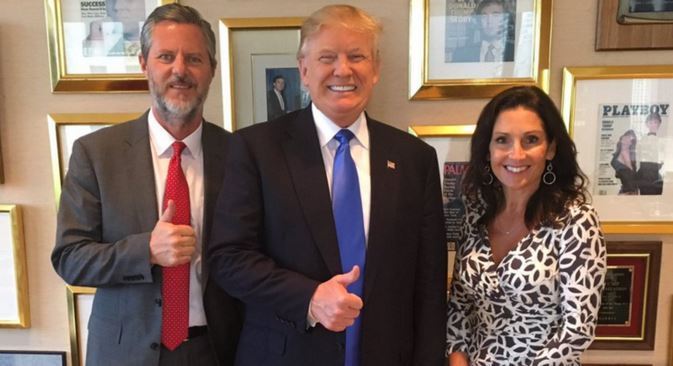No, I’m not going to say Donald Trump is the anti-Christ. Because I don’t believe that the Bible’s role when it speaks about an anti-Christ is to predict future events. But I think the term can still be useful. I would use it to signify the greatest adversary the church faces in a particular age. And I think the ideology Jerry Falwell Jr. laid out in a recent quote captures that adversary quite perfectly.
Why have Americans been able to do more to help people in need around the world than any other country in history? It’s because of free enterprise, freedom, ingenuity, entrepreneurism, and wealth. A poor person never gave anyone a job. A poor person never gave anybody charity, not of any real volume. It’s just common sense to me.
This is the American salvation story. Free enterprise is the savior of humanity. Like every dangerous heresy, this one involves half-truths. If you’re measuring in dollars, I’m sure that you could argue statistically that Americans have helped more people in need than any other country in history. Of course what does that “help” look like? Is it the US government paying American agribusiness to provide “foreign aid” to a country that floods its market with free food and puts all the local farmers out of business? How much “help” is actually corporate welfare to companies that make profits off of cushy government contracts?
It’s also a half-truth that poor people don’t create jobs. They don’t usually have enough liquid currency to pay other people to work for them. But poor people create jobs all the time. I was just at a New Year’s party with some former members of my youth group from ten years ago. And one of my favorite former youth has a new job as a community organizer working in the east Durham neighborhood she grew up in, a job that was created by poor people like her. And she’s not ever going to get rich doing it. Does that mean her impact is of less value than someone who makes and spends more money than she does?
Jesus was poor. He specifically told his disciples that their discipleship was a call to embrace poverty. He warns them that “foxes have dens and birds have nests but the son of man has no place to lay his head” (Matthew 8:20). For the apostle Paul and the early church, Jesus’ poverty was an indispensable aspect of his incarnation: “He made himself nothing by taking the very nature of a servant” (Philippians 2:7). When the church fathers looked at a verse like “Friendship with the world is enmity with God” (James 4:4), it was self-evident to them that “friendship with the world” means love of wealth and status (c.f. Basil the Great, John Chrysostom, et al). They hadn’t yet redefined “the world” to mean “Hollywood liberals” in order to exclude their BMW’s and jet skis from scrutiny.
In the American white evangelical theology that shapes Jerry Falwell, Jr., Jesus’ poverty is irrelevant. Jesus’ purpose is to fulfill a transaction that makes the core ethos of capitalism the fundamental principle of Christianity. There can be no default on debt owed to God just like there can be no default on debt owed to the World Bank. Jesus either pays the debt of our sin in his blood or we pay the debt through suffering eternally in hell. In this schema, Jesus’ blood is infinite capital. Jesus isn’t poor. He’s the richest being in the universe. And he uses his capital to create a gated community paradise where his rich Christian friends can live forever while most of humanity gets tortured forever. The American white evangelical gospel is the Bible selectively interpreted to accommodate the ideology of capitalism that Jerry Falwell, Jr. so perfectly encapsulates.
So what does the gospel look like when Jesus’ poverty isn’t erased by a transactional capitalist understanding of salvation? To me, one of the most important scriptures for understanding a non-capitalist Christian salvation is Paul’s declaration in Galatians 2:20: “I have been crucified with Christ and it is no longer I who live but Christ who lives within me.” And likewise, in Romans 6:4: “We were therefore buried with him through baptism into death in order that, just as Christ was raised from the dead through the glory of the Father, we too may live a new life.”
To the brass-tacks capitalist mind, these scriptures are just fluffy poetry that don’t define salvation. The brass-tacks capitalist mind sees all of scripture as one giant word problem like we used to have in third grade math class with a very simple transactional formula which enshrines the no-default law of capitalism. But when the capitalist lens is removed, these scriptures proclaim an atonement that is participatory instead of transactional. We are to be crucified and resurrected with Christ. His blood is not a credit card of infinite capital that swipes us into heaven; his flesh and blood are something that he tells us to put into our bodies for the sake of eternal life (John 6:54).
Jesus’ cross is an invitation not a payment; insofar as it functions as a “payment,” its purpose is to invite us to stop justifying our sins and enter into honest, authentic communion with God. We are invited to join Jesus in the poverty of his cruciform death and resurrection. To embrace Jesus’ cross in its full poverty and ugliness as the means of our salvation involves recognizing that the capitalist ideology Jerry Falwell, Jr. espouses is a core part of the sinful world that we need to be saved from.
I realize that the people who skimmed this article and are going to comment that I’m a “libtard socialist” probably will not have read this far. But I’ll say it anyway. What I’m talking about has nothing to do with whether the state or private investment controls the means of production in our country. I own stocks. I’ve had to learn small business principles in order to create a sustainable cafe ministry. Navigating a free market is one thing; letting capitalist ideology redefine your religion is another thing.
I’m thankful to people like Jerry Falwell, Jr. and Franklin Graham for continuing to expose the capitalist heresy that has corrupted white evangelical theology.
If you want to support my blog, the best way is to support my ministry with NOLA Wesley as a monthly patron or one-time contributor.













